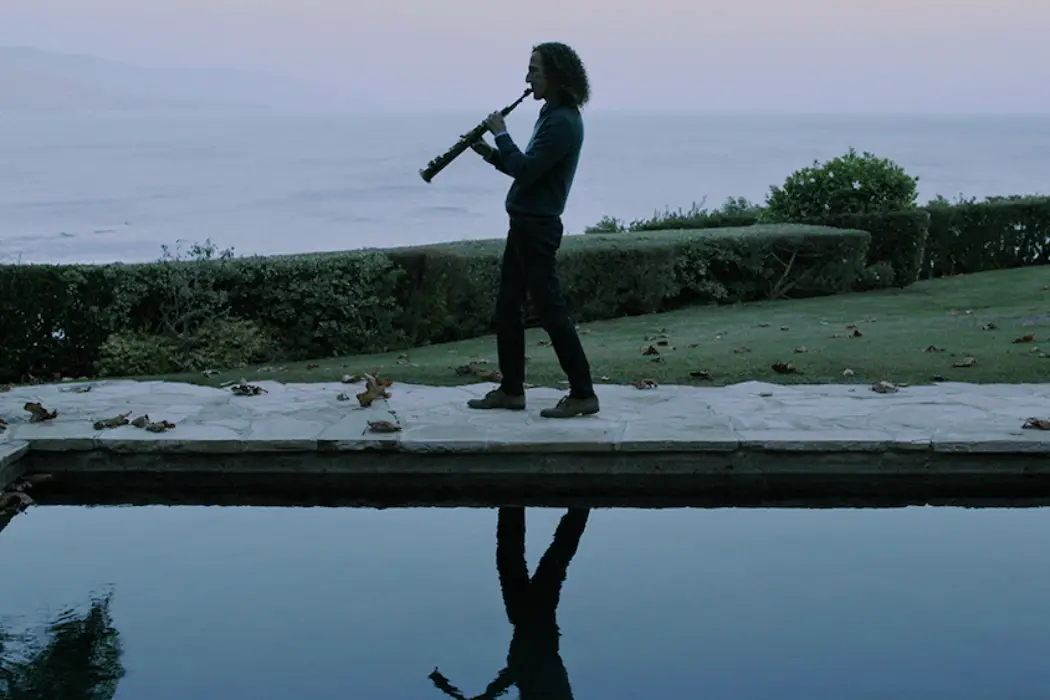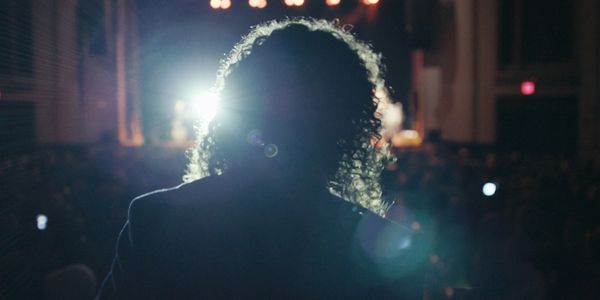TIFF 2021: Director Penny Lane for LISTENING TO KENNY G

Wilson is a cinema enthusiast based out of Toronto, Canada.…
Even if you don’t listen to his music, Kenny G is one of those figures in popular culture that most people will be familiar with, if not always for the right reasons. As one of the most successful saxophonists in the world, both in terms of record sales and general popularity, he has often been ridiculed for his contemporary sensibilities as a jazz artist, and has been featured as the butt of a joke in everything from late-night talk shows to cartoons like Family Guy and South Park. But if you’ve seen any of his interviews over the years, it’s easy to see his self-deprecating mannerisms and the way he doesn’t seem to let the comical (or negative) pokes bug him too much. Moreover, he never seems to agree with the critics who berate his work simply because of its mainstream popularity. Documentary filmmaker Penny Lane set out to examine, in her own words, this “inverse relationship between quality and popularity” and how this can do a major disservice to the way we appreciate and contextualize the work of an artist. Her newest documentary, Listening to Kenny G is a powerful examination of what art actually is or should be, and details this through the lens of an artist who is often not given the credit he deserves. She discussed her film with Film Inquiry during the 2021 edition of the Toronto International Film Festival.

Wilson Kwong for Film Inquiry: Given that the film is about how much popular culture has hated on Kenny G as an artist, how did you approach him for the overall idea of Listening to Kenny G?
Penny Lane: When I had the idea, I reached out to him and we set up a lunch meeting. I remember telling him that when I went to art school, there was this idea that if a particular work of art was really popular, it was really bad. There was like an inverse relationship between quality and popularity. That’s kind of what you learn when you go to a fancy art school, and you’re being taught to be a snob and an elitist. And I really didn’t like that, and it actually gave me a mission statement as an artist to just prove them wrong. I think there’s a way to make quality, intellectually rigorous, even challenging art. But also do it in a way where people enjoy themselves when they see it. And maybe even laugh, because laughter was also very, very suspicious in the world of fancy art. So I told him that I was interested in the issue of popular music, and how popular musicians tend to get shit on by a small minority of people, who think that their opinions are, just frankly, more valid than others’ opinions. He understood that completely, and this was nothing he hadn’t heard before in his own life. Importantly, I would never have approached him if I hadn’t looked at a bunch of interviews he’d already done in his career, and looked at his social media channels. And I hadn’t already determined that he had a sense of humor and was capable of laughing at himself, and capable of shrugging criticism off.
So it sounded like nothing was really off the table when it came to what you could ask him during the on-screen interviews?
Penny Lane: Not really. I gave him a pretty clear sense going into it that I was interested in this particular set of issues and that I wasn’t really interested in his personal life. So he knew going in that I wasn’t going to be prying about his divorce or something, and that it wasn’t that kind of project. Where he was going to have to make difficult decisions about private things to share, I was approaching him as an artist. And I wanted to understand him as an artist, not in some kind of psychodrama sort of way.
Can you talk about your own personal relationship with Kenny G before making this documentary? Were you someone who already listened to his music, or did you do that after coming up with the idea of exploring a popular artist?
Penny Lane: It started as the idea, and then I looked for a vessel. But then when I got to know Kenny, of course, the project evolved and changed. And it became at least as much about wanting to accurately represent who he is, and give a sense of how he came to be who he is. So that evolved. He obviously doesn’t just remain a vessel for an idea, I hope, in the film. But to answer your question in the other way, when I was a teenager in the ’90s, I didn’t personally have any particular opinions about Kenny G. But I was very aware that in my friend circle, he was like a punch line, and I knew some people who really hated him and hated what he stood for. It was really like an angry response, that even at the time, I thought was a little over the top.
One thing that Kenny G is portrayed in the film reminds me about is the whole debate around streaming versus the theatrical experience, or shooting on digital versus film, and just this idea of new versus old. With Kenny G, there’s almost this debate about new versus old/traditional jazz, and some people seem to be hesitant about his music because of that. But the thing is, whereas in those other examples, the ‘new’ thing has really taken over, I don’t think there’s another example of someone like Kenny G in the jazz world. It doesn’t seem like there’s anyone else really like him.
Penny Lane: I mean, that’s actually one of the interesting things that I realized was even more interesting about Kenny, which was that uniqueness. There’s just never been anyone like him. There’s never been anyone with that kind of career. If you look back and you think, “My goodness, how did that even happen?” He did not follow a path that was set out for him. He really created his career in a way that was so active. And I know you saw the film, and that story about The Tonight Show is revelatory. Because it shows that the reason his career became what it was, was not that he was dreamed up in a laboratory by some evil record executives. No, he was a person who was fighting to develop and to present his authentic self as an artist. And that active rebellion that launches his career, I think is really going to be revelatory for a lot of audiences. I don’t think a lot of people are thinking like, “Oh, how did Kenny G‘s career start? Maybe it started in an act of rebellion.” So I think that there’s no one like him. And I tried to think many times, like, “Who is the Kenny G of today?” And if you have any ideas, let me know!

I definitely can’t think of anyone else! In terms of the people you interviewed for the film, specifically ones who weren’t necessarily a fan of Kenny G’s work, do you feel like they knew his origin story and how he actually came about into the jazz world?
Penny Lane: No, they didn’t know anything about it. I mean, the jazz critics that I spoke to were exceptional, and they were all incredible geniuses and I loved talking to them. And I approached them because I had so much respect for the nuance that they approached their writing with. And I thought, “Well, who’s going to be games to do this?” right? Because they’re not Kenny G experts. I mean, there aren’t any. If you’re like, “Oh, who are the music critics that are Kenny G experts?” I don’t think you were going to get very far. So they had done their homework, for sure. Certainly, between the time that I had initially approached them, and the time they came to the studio, all of them had done some kind of research, but they were not people that were experts on Kenny. They did not know where he came from, and they really didn’t know that much about his career or him at all. Like me (before this film), he was just there. I think that’s what Ben Ratliff says at the beginning of my film. He was just there, and you never really thought about where he came from because he was just there.
And compared to your other documentaries, was focusing on a single subject like this a very different experience?
Penny Lane: As a documentarian, I had never made a film starring someone so charismatic. There was an element of it that was such a breeze because he was just so great on camera. You turn the camera on, and every minute of it was golden. Whereas I’m not trying to be mean, but most normal people who are documentary subjects, it’s not like that. You have to film a lot more to get the great moments, but he’s just on all the time, and he wants to give you a great performance. So I think that the most surprising part for me, and the most different part of this experience for me, was how just making a film about a professional performer has its benefits.
When I was reading through your press notes, there’s a statement about how this documentary will hopefully change the way that people listen to Kenny G. So I was just wondering, does Kenny G himself think that this documentary might change the way his music is perceived? And how has it changed your own perception of his music after making this film?
Penny Lane: So one of the reasons Kenny was such a joy to work with was because I think he trusted me. And I think if he were on this call, he’d agree. I think he trusted me enough to not really know what the movie would be like. So I don’t think he had very strong ideas about what people would get out of seeing it. I think he was just sort of like, “I don’t know why you want to make a movie about me, but okay.” And then I think he trusted me to figure something out, but I don’t think he thought it was going to be very interesting. But I do know what he’d say now. I mean, somewhere along the way, I think he would’ve said that he really wanted to get across to people that he is a really hard worker. And that all of the success didn’t just happen for him, but that he really takes his work very seriously. And that he’s not just playing golf all day, he’s still practicing three hours a day, every day. He wanted people to know that about him, and that he’s not just phoning it in. For me, I would say that I totally hear his music differently now. I don’t think you can be with all of these people just loving his music, and not be affected by that. It doesn’t matter if it rings your particular bell. I really developed such a different emotional feeling hearing it. And so I picture that audience, and I’ve never been in an audience that diverse. None of the music shows that I go to have grandparents and grandkids, and people of every race, and every accent, it was remarkable. And so I thought, looking around that room, “This is beautiful.” And especially seeing the wedding videos, that really got me. It still really gets me, it makes me cry every time I even think about it. All these people furiously arguing over the definition of jazz, really feels beside the point, when you watch somebody who’s chosen this music for the most important day of their life. It’s a real conversation ender for me.
I wanted to end off by talking about one of the final sequences in the film, where Kenny G reveals how he wants to win an Oscar one day and starts giving movie examples. I feel like if that scene happened at the beginning of the film, it would’ve seemed really odd and almost pretentious. But the fact that it happens at the end and you get to see what kind of person he really is, the scene makes complete sense and is so fun to watch. I’m really curious how that scene came to fruition. Was it prompted at all?
Penny Lane: He would bring it up all the time! It was not one time, it was so many different times. He would just be like, “Oh, also, I really want to score a film, and here’s my idea for it.” So I had that idea early on, but it’s funny you say that if it had been at the beginning, it would have been really weird. I think that he’s such a supremely self-confident person and I think that a lot of people find that very provocative, provoking, and almost angering. Like, “Why are you so self-confident?” So we definitely had to thread the needle with that. I would never have started the film with his confident assertions that his movie scores will win Oscars. But once you’ve gotten to know him a bit, then you get a sense that, love him or hate him, this is what he’s like. He’s not putting on an act, he’s truly a person who loves himself and feels very confident in his decisions.
Listening To Kenny G premiered at the 2021 Toronto International Film Festival
Does content like this matter to you?
Become a Member and support film journalism. Unlock access to all of Film Inquiry`s great articles. Join a community of like-minded readers who are passionate about cinema - get access to our private members Network, give back to independent filmmakers, and more.
Wilson is a cinema enthusiast based out of Toronto, Canada. He escapes from his day job by writing random thoughts about cinema on the internet. Although he has a longstanding penchant for Hong Kong cinema, he considers himself to be an advocate for Asian cinema in general. He has been attending the Toronto International Film Festival every year since 2005, and more of his work can be found on his website: www.wilson-kwong.com.













